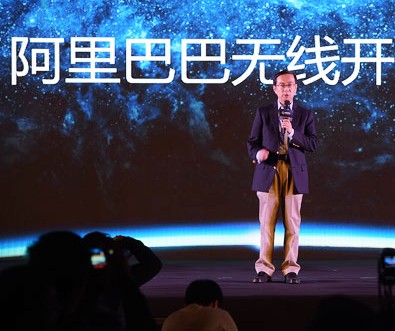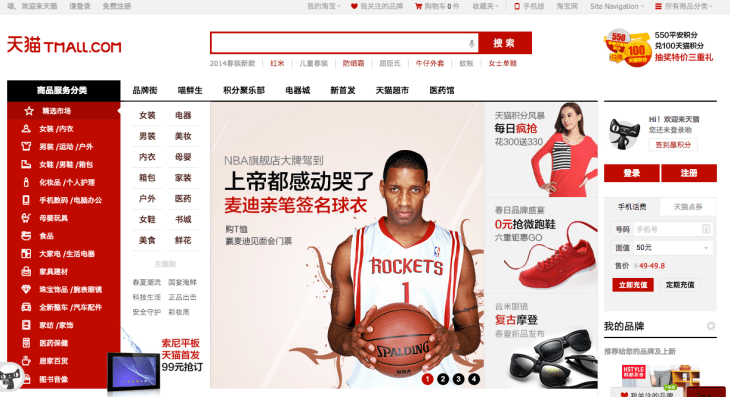As newly public Alibaba continues to invest in startups to build out its presence in the U.S., it’s also looking at ways of expanding its ecosystem and platform at home.
The latest move was announced this week, as the company unveiled Baichuan — Chinese for “hundreds of rivers.” Taking a page from Amazon — which has built up a large range of services for mobile developers — this is a new one-stop-shop for mobile app developers that Alibaba hopes will spur them to build apps on its platform.
Alibaba says these could include mobile-shopping apps, but also social-sharing apps, location-based services, online-to-offline services and more, using Alibaba infrastructure and specifically integrating the apps with existing Alibaba services like Taobao Marketplace, Tmall.com, Mobile Taobao and Alipay Wallet.
 Alibaba claims that the range of services that it will offer to developers will be so complete that development teams will “no longer need a CTO,” in the words of Alibaba VP Wang Ruoxi, speaking at the company’s developer conference this week. “A product manager full of ideas could quickly develop an outstanding app.”
Alibaba claims that the range of services that it will offer to developers will be so complete that development teams will “no longer need a CTO,” in the words of Alibaba VP Wang Ruoxi, speaking at the company’s developer conference this week. “A product manager full of ideas could quickly develop an outstanding app.”
It’s also considering giving some financial backing to some of the apps and startups that will come out of the effort — although it’s not going into much detail on this point yet.
There will also be workspace on offer in Beijing, Guangzhou, Shanghai, Hangzhou and Chengdu.
Baichuan, Alibaba says, will aim to make app creation “cheaper and faster, and therefore more profitable for struggling startups.”
The more pragmatic idea here for Alibaba, of course, is that this will drive more traffic and transactions to its platform particularly on mobile devices, so that Alibaba has a hope of being as dominant in mobile as it is already on the web, and so that the brightest developers don’t try to create apps that would actually compete against Alibaba.
Developers will be able to drill down and create apps that will highlight certain categories in the mass of Alibaba inventory, and drive more business to Alibaba as a result. In other words, Alibaba is taking the marketplace model that it used to build out its own shopping services and applying it to apps.
We have reached out to Alibaba to ask about how it plans to share revenue with app developers.
Just as Amazon’s developer services have helped cement the company and its AWS platform as an important part of the infrastructure for mobile developers, Alibaba hopes it can become the center of a similar ecosystem. But it also hopes to go one step further. The apps that would be built on top of its existing e-commerce plaform will potentially drive a lot more traffic and transactions to Alibaba’s main retail cash cows.
It’s a sign of the maturation but also fragmentation of the Chinese smartphone and apps market — and the company’s limitations in trying to serve all of it. “Demand is growing for smartphone solutions that are tailored to niche markets and individual user needs,” the company noted on its blog today, “demand that Alibaba cannot meet alone.”
It’s not the only way that Alibaba is building and diversifying at home. Yesterday, Costco inked a deal to go into China via a presence on Alibaba’s Tmall.
We have reached out to the company to ask if it will be targeting Baichuan at developers in other markets outside of China — either in Asia or further afield, as part of its strategy to grow its international business.
Meanwhile, speaking at the company’s mobile strategy day yesterday, Alibaba Group COO Daniel Zhang downplayed Alibaba’s own retail strength (which will mean that it would compete against any app built on its platform), describing Alibaba’s “mature e-commerce infrastructure and capacity” and the company’s new and open approach to working with third-party developers. “With increasingly diverse applications, services and consumer needs, we have to remove restrictions in our ecosystem,” he said.
As of 2013, China had 500 million mobile Internet users, and they spent nearly $18 billion on services that year.
Alibaba says that Baichuan will give developers access to software and data-analytics tools. It will offer this by way of AliCloud, Alibaba’s equivalent of AWS, which the company says will provide technical support, SDKs and “private mentoring” in the areas like software architecture and data security. Umeng — the “Flurry of China” acquired by Alibaba last year, will also be a part of the mix, providing analytics data around buying patterns and other transaction data, and ads.
